Writer:Grant MorrisonPenciller:Doug MahnkeInkers:Christian AlamyMark IrwinKeith ChampagneJaime MendozaColorists:Gabe EltaebDavid Baron
Comics aren’t meant to make readers feel guilty, but The Multiversity: Ultra Comics #1 paints the fan as the individual leading the protagonist to his ultimate fate. This is it – the haunted story teased since the first installment of Author Grant Morrison’s magnum Multiversity opus. The Multiversity as it stands is my favorite ongoing series from superhero publisher DC, it’s something that’s hard to believe anyone at the Big Two could even think about publishing. Morrison has been circling a sphere of comics self awareness with titles like Animal Man for several years now, and this feels like the natural progression of all those titles. Even though the writer continues to discover new things about self reflexive superheroes, he never feels like he’s repeating himself in this work. The ideas of the Psycho Pirate and Animal Man being erased from continuity is far different from than the mechanically engineered Ultra Comics presented in this work.
Standing on it’s own merits devoid of what came before with the series, is this book good?
Yes. The story can simply be read without that context via the playful opening from Morrison and the exceptional Doug Mahnke (who’s pencils have been sorely absent from Green Lantern.) Nearly every idea within this saga is a reintroduced story beat hatched from the DC vault. Still, this hero (Ultra Comics) emerged from pretty obscure roots and builds on nearly everything that Morrison has done with the DC Universe. There is even a reference to Final Crisis directly in this title showing that Morrison takes this absurdist pillar of the DC landscape that he has built extremely seriously.
The first thing that catches my eye about The Multiversity: Ultra Comics #1 is the Doug Mahnke cover. The piece is elegantly designed yet filled with utter madness reflecting some of the best covers from tales long ago. The text reading “YOU MUST NOT READ THIS COMIC,” should be the first clue that this is one of the most subversive and enthralling DC books you’re going to find this side of Convergence. What follows this is stirring image complete with a warning from Ultra Comics (our protagonist) to not finish this issue for the sake of his own very life. The storytelling stakes are set in this issue, and if we the reader choose to continue reading we’re to believe that the very fate of Ultra Comics has been decided. That’s a lot to take in over the span of just one story, and my own personal guilt regarding what happens next led is my own fault.
The first issue of The Multiversity arguably mixed the most concepts and characters and introduced us to the primary threat featured in this story – it’s essential reading to anyone left scratching their heads with this issue. This can be read stand alone as mentioned earlier, but to enjoy this text to the fullest a background in Morrison DC’s work is ideal. Ultra Comics is a book was first introduced via the live dissection from a Monitor within that issue. As a result, don’t expect this comic to be an easy read without the context of the broader series. It’s tempting to say that the threat of this book will be capitalized on as the baddie for the full Multiversity event, but Morrison has trained readers not to look at his work with such a clear lens. The Gentry are not everything that caused the bleakness in Multiversity – as the Multiversity Guidebook clearly articulated.
Mahnke’s storytelling skills haven’t missed a beat. The artist perfectly captures the detailed linework and impossibly huge facial expressions that make this work something truly special. His haunting images are best utilized in the context of horror, which this series arguably falls under. The villains contained within this story are terrifying, silly, and then maddening all in the context of one issue. Mahnke is called upon to be a really versatile artist in this experience, and does a great job on the static rendition of Ultra Comics nobly glimpsing at the reader. Also called upon are several other small flashes of violence with an exploration into the brutality buried deep within superheroes. Christian Alamy, Mark Irwin, Keith Champagne, and Jamie Mendoza bring this issue to a total of four inkers in this oversized. There are the occasional moments of inconsistency here, but overall this is some admirable work from the four mostly blending into each other and not detracting from the reader experience too much. The important part of the art in this issue is that Mahnke was allowed to draw a riveting horror comic.
There are so many different ideas crammed into this one piece of writing. The self reflexive asides kept the plot from becoming too complicated or too pedestrian. The buffer of Ultra Comics explaining his bizarre inner thoughts to the reader perfectly bring casual fans into the strange world of the title. There are so many different ways in which the story engages with readers, whether it be through Ultra Comics speech patterns, inner thoughts, dialogue trees, word balloons, and even meta-commentary within the context of the work itself.
To say much more about this story would spoil the delightful surprises waiting inside for readers to engage with. The Multiversity: Ultra Comics #1 is the only comic that ever melted off my face and left me in charge of the fate of my new favorite superhero.
I’m sorry Ultra Comics.


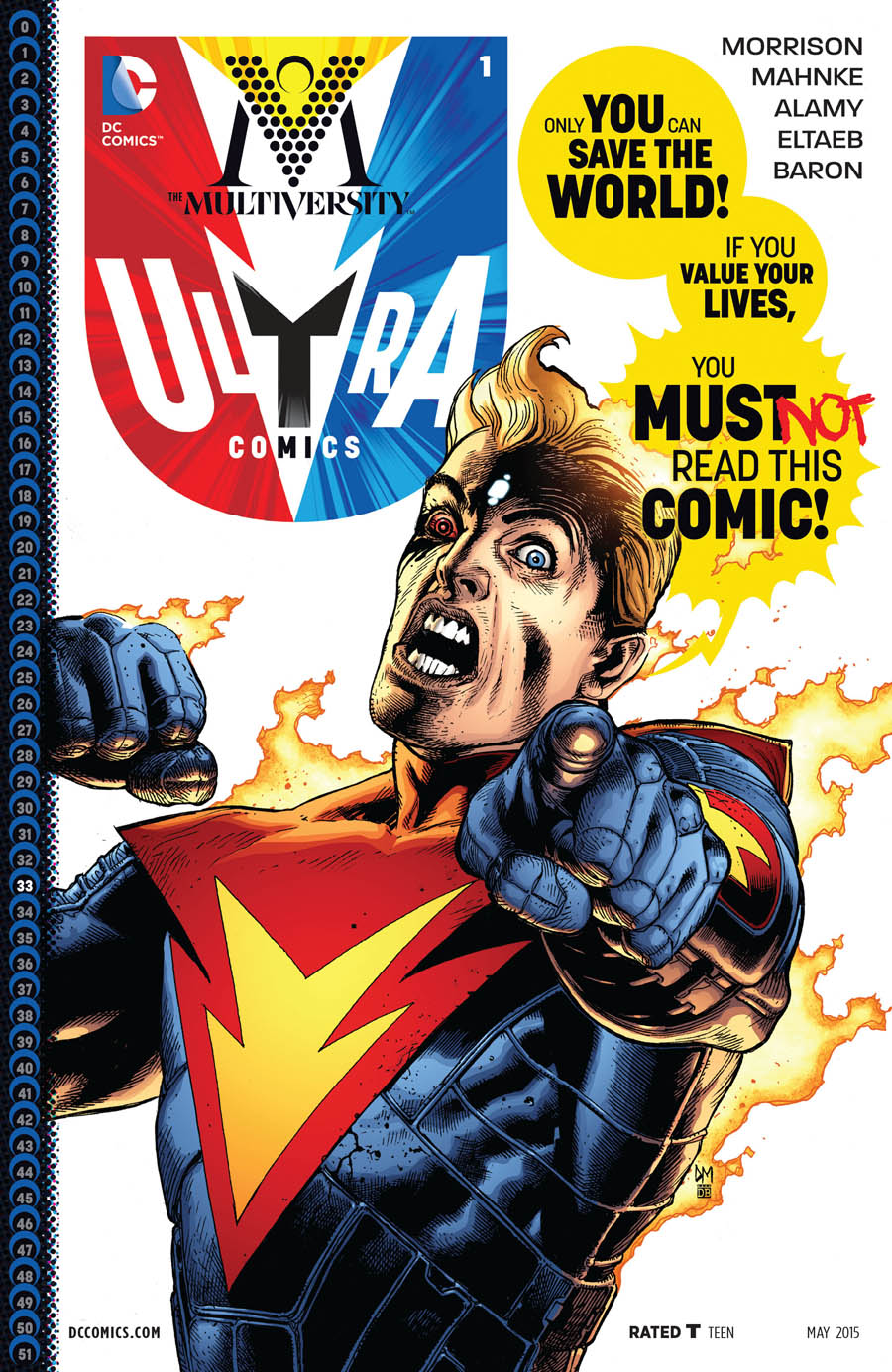
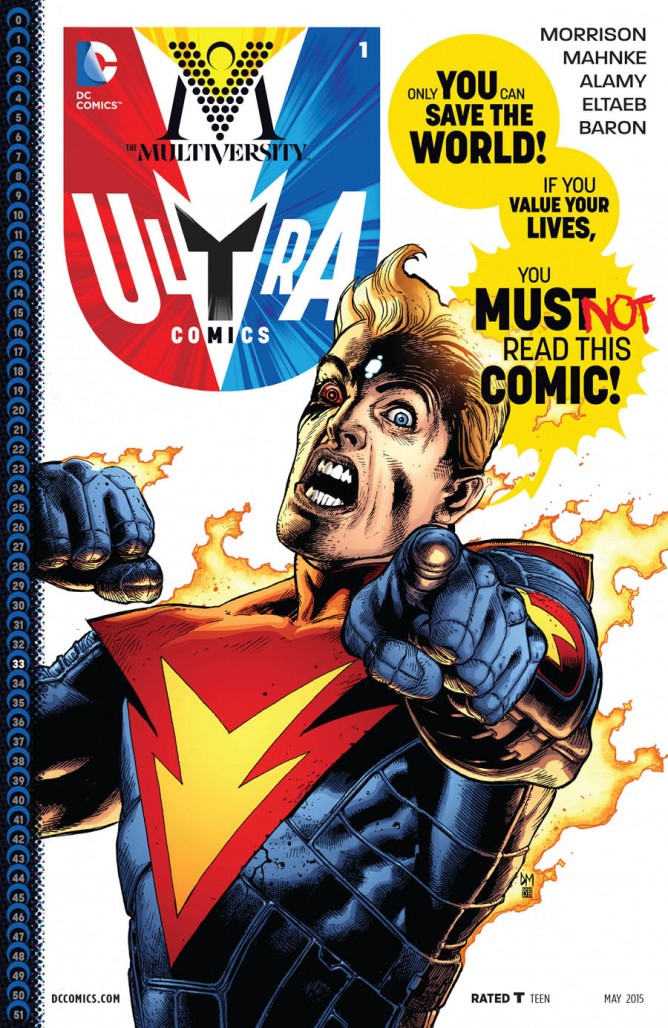

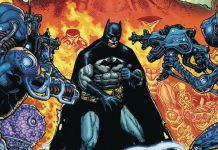
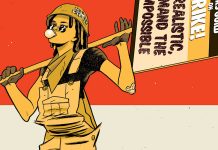
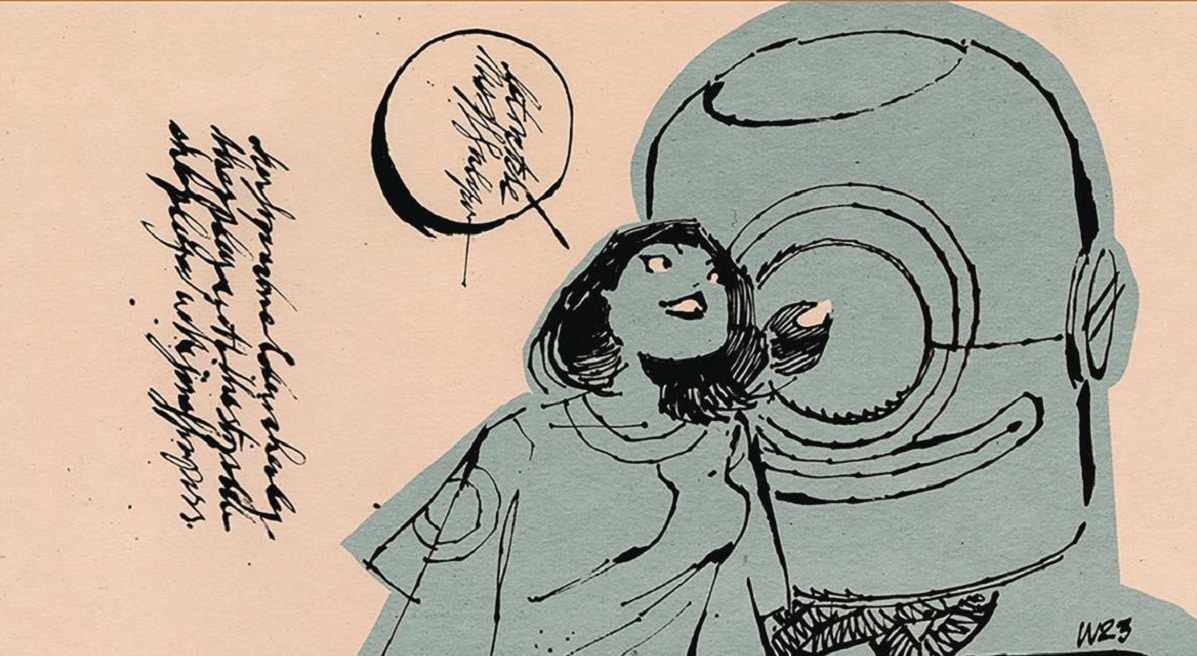

Grant Morrison has outdone himself with comics-about-other-comics here. This series has been so self-referential and obfuscatory that I have no idea who it was intended to please, besides G-Mo.
It definitely pleased me! But then again, I think Final Crisis is the best event comic ever made…so…grain of salt, I guess?
This was an amazing book, but I take issue with your citing of 1994’s Ultraverse. Ultraverse was an indy line of superhero comics, later bought by Marvel. You may actually be thinking of Grant Morrison’s concept of Hypertime (1999), which was the meta-continuity of all comics.
I would also like to point out that, following the theme of Multiversity where each issue is set on a different “classic DC-Earth” (Earth 1, 2, X, S, etc), this one is set on Earth Prime. Earth Prime is “our” Earth, where there are no superheroes and all the DC comics are, really, just comics that we read. Eventually, Earth Prime was written to have one superhero: Ultra. Right there is yet one more layer of comics-love that Morrison writes into this issue. It is also one more reason this issue is pretty amazing stuff.
All of Multiversity makes me think, “Oh, here’s why I used to love DC comics.”
Why do people who clearly don’t care for Grant Morrison’s work keep reading Grant Morrison’s work?
I read this, because I DO care for Grant Morrison’s work, and I loved it. I don’t think it reaches the heights of the “Pax Americana” and “Thunderworld” chapters, but it’s a great installment in Morrison’s ongoing meditation on superhero comics, and Doug Mahnke’s art is fantastic.
I think Ultra Comics is just as strong as the Pax Americana and Thunderworld installments, but it’s an apples and orange thing. They’re all really different, telling different kinds of stories. But equally successful. Ultra Comics was definitely successful in giving me the creeps! Not since the Bulletproof Coffin have I read a superhero comic so saturated in wrong-ness…the whole thing unfolded like a nightmare or a bad trip.
The big bad is an EGG?!
I like the work of Grant Morrison
This entire series has been a treat, and Ultra Comics was no exception. I wasn’t quite sure what to expect from it even with how it has been hovering in the background for the entire series so far, and it was great. All of the little Easter-eggs for the long-time DC fans were a trip, but the story itself was just great. I think I read the issue 6 times that first night – nothing else got read on Wednesday because I was just picking apart Ultra Comics and mulling it over. It is easily the most Grant Morrison comic Grant Morrison has ever written (to the point where I’m pretty sure he was making fun of himself and some of his own tics in it).
I’m curious to see how he ends it all in Multiversity #2, given that at this point it feels pretty much like he’s done saying what he wants to say. But then that’s Morrison’s writing in general – the journey through the story is almost always better than his endings.
Comments are closed.